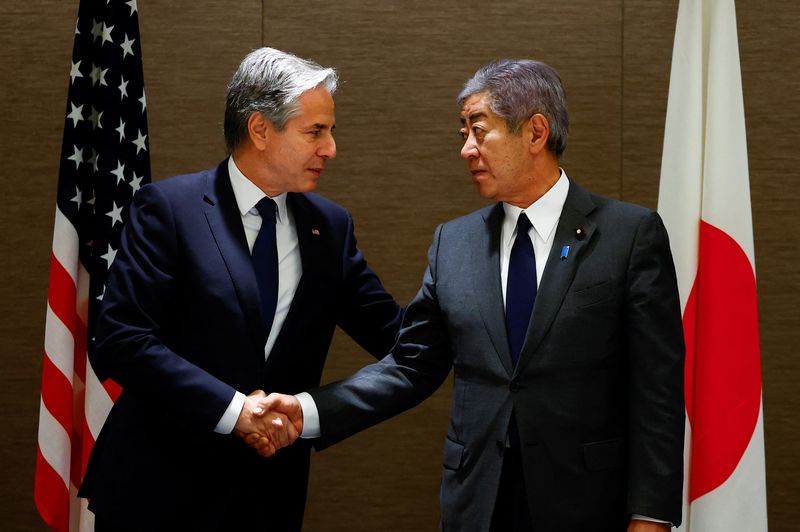By David Brunnstrom, Simon Lewis (JO:), Trevor Hunnicutt and Tim Kelly
WASHINGTON/TOKYO (Reuters) -U.S. President Joe Biden’s choice to dam Nippon Metal’s $14.9 billion bid for U.S. Metal forged a shadow over Secretary of State Antony Blinken’s go to to Japan on Tuesday for farewell conferences with Washington’s most necessary ally in Asia.
The rejection, introduced on Friday, has jolted U.S. efforts to spice up ties with Asian allies simply as South Korea’s political disaster probably complicates a revived relationship between Washington, Seoul and Tokyo. The trilateral alliance is a key plank within the nations’ efforts to counter China’s navy buildup.
Funding into the U.S. is also chilled, however analysts say any harm to the broader U.S.-Japan relationship will doubtless be restricted given shared safety issues about China.
On Monday, Japanese Prime Minister Shigeru Ishiba described Biden’s choice to dam the sale of U.S. Metal to Nippon Metal as “perplexing”.
Accompanied by White Home Nationwide Safety Adviser Jake Sullivan, Blinken met Japan’s International Minister Takeshi Iwaya in Tokyo and can maintain talks later within the day with Ishiba and different senior Japanese officers
Quite a few journeys to Japan over the past 4 years “is evidence not just of the importance, but of the centrality the United States attaches to our partnership. President Biden asked me to come on this last trip to underscore that,” Blinken instructed Iwaya.
“We have, between our two countries, a partnership that started out focusing on bilateral issues, that worked on regional issues and that now is genuinely global,” he added.
Forward of his journey, the State Division mentioned that Blinken needed to construct on the momentum of U.S.-Japan-South Korea trilateral cooperation.
In Seoul on Monday, Blinken reaffirmed confidence in South Korea’s dealing with of its political turmoil as investigators there sought an extension of a warrant to arrest impeached President Yoon Suk Yeol.
Allies of U.S. President-elect Donald Trump have additionally reassured Seoul and Tokyo that he’ll help persevering with to enhance ties and advance navy, financial and diplomatic cooperation to counter China and North Korea, Reuters reported forward of Trump’s Nov. 5 re-election.
TENSION, LIMITED DAMAGE FROM NIPPON STEEL DECISION
Nippon Metal and U.S. Metal filed a lawsuit on Monday charging that Biden violated the U.S. Structure by blocking their $14.9 billion merger via what they termed a sham nationwide safety evaluation. They referred to as for the U.S. federal court docket to overturn the choice.
Nicholas Szechenyi, a Japan professional at Washington’s Middle for Strategic and Worldwide Research, mentioned Biden’s choice would make Blinken’s Tokyo go to “awkward.”
Nevertheless, “Japan won’t let the Nippon Steel decision poison the U.S.-Japan relationship; it’s too important for Japan’s national security,” he mentioned.
A Japanese diplomat instructed Reuters Biden’s choice may chill international direct funding, however hoped shut U.S.-Japan relations would proceed, with a robust emphasis on re-establishing the robust ties with Trump seen throughout his earlier administration, and profiting from the more and more hawkish temper in Washington on China.
Business lobbies in each Japan and the U.S. pushed exhausting for the merger, backing their arguments with warnings in regards to the impact on the very important U.S.-Japan relationship.
However the merger confronted opposition from each Biden and Trump, who takes workplace on Jan. 20 and was assiduously courted by Japan within the run as much as his re-election.
Trump reiterated after his re-election that he was “totally against” the merger and vowed to dam it as president and help U.S. Metal with tax breaks and tariffs.
A former senior official in Trump’s first administration instructed Reuters he believed Trump would have taken the identical strategy as Biden.

Marc Busch, a fellow at Georgetown College’s McDonough College of Business, forecast “significant fallout” for U.S. efforts to work with allies to create resilient provide chains within the face of Chinese language dominance or competitors in key areas.
“Japan and other allies will have doubts about investing in or aligning with politically sensitive U.S. supply chains. China must be chuckling to itself that it could never have hoped for a better outcome.”




